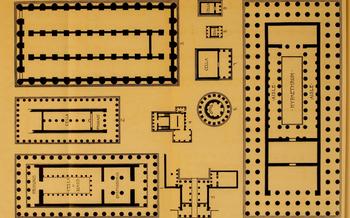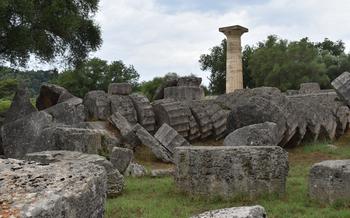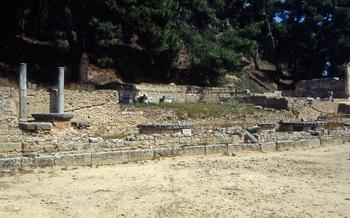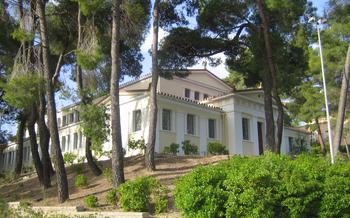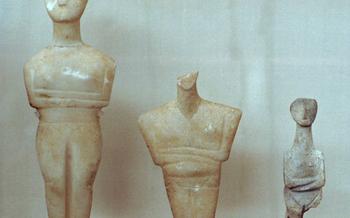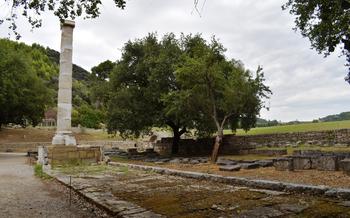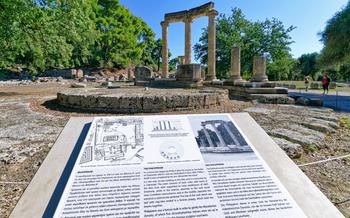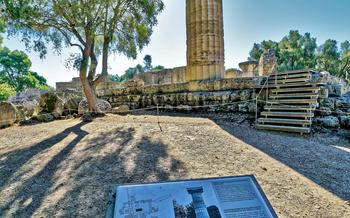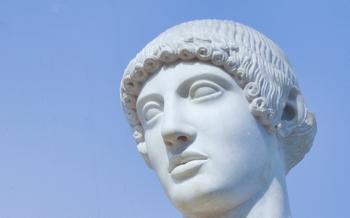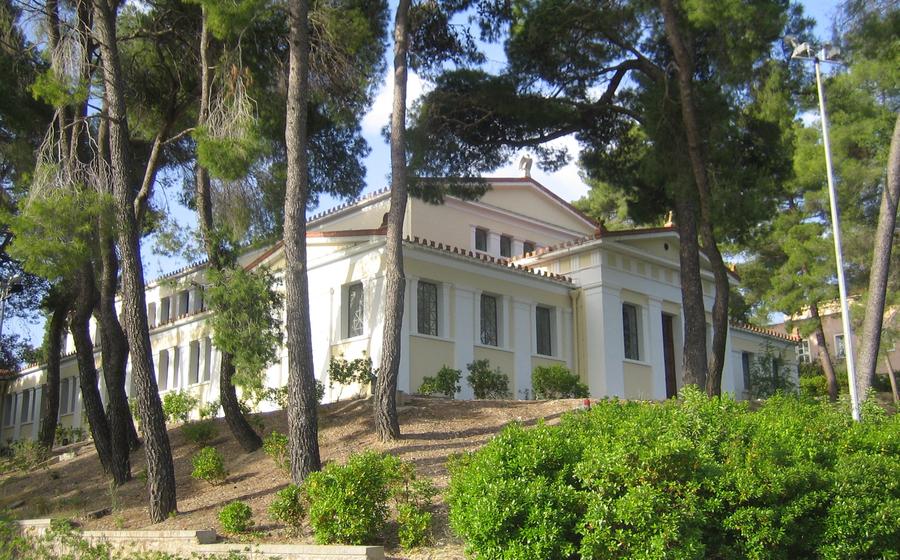
Museum of the History of the Ancient Olympic Games
- History of the Museum of the History of the Ancient Olympic Games
- Location and Accessibility
- Exhibitions and Displays
- Olympic Games History
- Athletic Competitions
- Religious Significance
- Cultural Performances
- Educational Programs
- Guided Tours
- Souvenirs and Gifts
- Accessibility for Visitors with Disabilities
- Nearby Attractions
- Food and Dining Options
- Photography and Social Media
- Insider Tip
History of the Museum of the History of the Ancient Olympic Games
The Museum of the History of the Ancient Olympic Games in Olympia, Greece, stands as a testament to the enduring legacy of the ancient Olympic Games, one of the most significant events in human history. Founded in 1888, the museum's mission is to preserve, study, and present the rich history and cultural significance of the games that were held in Olympia from the 8th century BC to the 4th century AD.
The ancient Olympic Games were a major religious and athletic festival held in honor of Zeus, the king of the gods in Greek mythology. Every four years, athletes from all over the Greek world would gather in Olympia to compete in a variety of sports, including running, wrestling, boxing, chariot racing, and the pentathlon. The games were not only a celebration of athleticism but also a symbol of unity and peace among the Greek city-states.
The Museum of the History of the Ancient Olympic Games plays a crucial role in preserving and promoting this remarkable heritage. It houses a vast collection of artifacts and exhibits that provide visitors with an in-depth look into the origins, development, and impact of the ancient games. Through its exhibitions, educational programs, and cultural events, the museum serves as a vibrant center for the study and appreciation of this ancient tradition.
Location and Accessibility
The Museum of the History of the Ancient Olympic Games is situated in the heart of Olympia, the birthplace of the ancient Olympic Games. It is conveniently located on Vassileos Georgiou B', a short walk from the archaeological site of Olympia. Visitors can easily reach the museum by foot, bicycle, or car. For those arriving by car, there is a designated parking area near the museum.
The museum is open to the public from 8:00 AM to 3:00 PM, Tuesday through Sunday. Admission fees are 6 euros for adults, 4 euros for students, and free for children under 6 years old. Reduced admission rates are available for groups and senior citizens.
Exhibitions and Displays
The Museum of the History of the Ancient Olympic Games houses a remarkable collection of artifacts, interactive displays, and multimedia presentations that bring the ancient games to life. The permanent exhibition, titled "The Olympic Games: A Celebration of Sport and Spirit," offers a comprehensive overview of the history, rituals, and significance of the games. Visitors can admire a vast array of artifacts, including ancient sculptures, pottery, coins, and inscriptions that offer glimpses into the athletic, cultural, and religious aspects of the games.
Among the highlights of the collection is the famous statue of Hermes carrying the infant Dionysus, a masterpiece of Greek sculpture from the 4th century BC. Other notable exhibits include the discus of Myron, a bronze statue that portrays the ancient Greek athlete Myron in the act of throwing a discus, and the Nike of Paionios, a stunning marble statue of the goddess of victory.
The museum also features several interactive displays and multimedia presentations that allow visitors to engage with the ancient games in a dynamic and immersive way. Visitors can watch short films about the history of the games, compete in virtual athletic competitions, and learn about the training methods and techniques of ancient athletes.
Olympic Games History
The history of the ancient Olympic Games is a fascinating tale of athleticism, competition, and religious devotion. Originating in the 8th century BC, the games were held every four years in Olympia, a sanctuary dedicated to the Greek god Zeus. The games were a celebration of Greek culture and unity, and they attracted athletes and spectators from all over the Hellenic world.
The Olympic Games consisted of a variety of athletic competitions, including running, jumping, wrestling, boxing, and chariot racing. The games were also a showcase for the arts, with poets, musicians, and dancers performing during the festivities.
One of the most famous stories from the ancient Olympic Games is the tale of the legendary runner Pheidippides. In 490 BC, Pheidippides ran from Marathon to Athens to deliver news of a Greek victory over the Persians. He covered the distance of about 26 miles in record time, and his feat is commemorated by the modern-day marathon race.
The ancient Olympic Games were more than just a sporting event. They were also a deeply religious festival, with athletes and spectators paying homage to the gods of Olympus. The games were also a time of peace and truce, when all wars and conflicts were suspended.
The Olympic Games were eventually banned by the Roman emperor Theodosius I in 393 AD, as they were seen as a pagan festival. However, the spirit of the games lived on, and they were revived in the late 19th century by the French scholar and educator Pierre de Coubertin. The first modern Olympic Games were held in Athens in 1896, and they have been held every four years since then, with the exception of the years during the World Wars.
Athletic Competitions
The ancient Olympic Games featured a variety of athletic competitions that showcased the physical prowess and skills of the participants. These competitions included:
-
Running: The most prestigious event was the stadion, a footrace of approximately 192 meters. Other running events included the diaulos (two laps of the stadion), the dolichos (a long-distance race), and the hoplitodromos (a race in full armor).
-
Jumping: The long jump and the triple jump were popular events, with athletes using weights to gain momentum.
-
Throwing: The discus and javelin throws were tests of strength and accuracy. The discus was a heavy stone or metal disk, while the javelin was a long, slender spear.
-
Wrestling: Wrestling was a full-contact sport that allowed various techniques, including grappling, throwing, and joint locks.
-
Boxing: Boxers wore leather straps around their hands to protect their knuckles and used a variety of punches to defeat their opponents.
-
Pankration: Pankration was a brutal combination of boxing and wrestling, with few rules and no holds barred. It was considered the most challenging and dangerous event of the ancient Olympic Games.
The competitions were fiercely contested, and athletes trained rigorously to achieve victory. Winners were awarded olive wreaths and eternal glory, becoming heroes in their hometowns. The Olympic Games played an essential role in promoting physical fitness, sportsmanship, and friendly competition among the ancient Greeks.
Religious Significance
The ancient Olympic Games were deeply intertwined with Greek religion and mythology. The games were held in honor of Zeus, the king of the gods, and were considered a sacred event. Before the games began, a grand procession would take place, led by priests and priestesses carrying offerings to Zeus. Animals were sacrificed, and prayers were offered for the success of the games and the well-being of the athletes.
One of the most important religious rituals associated with the games was the Olympic Truce. This was a period of peace that was declared throughout Greece during the games. The truce was intended to allow athletes and spectators to travel to and from Olympia safely. It also provided an opportunity for enemies to put aside their differences and come together in the spirit of competition.
The Olympic Games were also closely linked to Greek mythology. Many of the sports and rituals associated with the games were said to have been created by the gods themselves. For example, the footrace was said to have been invented by Hermes, the messenger of the gods, and the discus throw was said to have been invented by Apollo, the god of music and poetry.
The religious significance of the ancient Olympic Games helped to create a sense of awe and wonder among the athletes and spectators. It also helped to promote peace and unity throughout Greece.
Cultural Performances
The Museum of the History of the Ancient Olympic Games is not just a treasure trove of artifacts and information; it also serves as a vibrant cultural hub, hosting a variety of performances and events that bring the ancient Olympic spirit to life. Traditional Greek music, dance, and theater performances are regularly showcased, transporting visitors back in time and immersing them in the rich cultural heritage of Greece.
These performances are not mere reenactments; they are dynamic expressions of living traditions, passed down through generations. The haunting melodies of the lyre and aulos fill the air, accompanied by the rhythmic clapping and stamping of feet. Dancers in colorful costumes twirl and leap, embodying the grace and athleticism of ancient athletes. Actors bring to life the stories of legendary heroes and gods, their voices echoing through the museum's galleries.
More than just entertainment, these performances offer a deeper understanding of the ancient Greek worldview, where art, athletics, and religion were intertwined. They provide a glimpse into the lives of ordinary people, who celebrated the Olympic Games not only as a sporting event but also as a cultural and religious festival.
Visitors to the museum are encouraged to take part in these cultural performances, immersing themselves fully in the Olympic experience. Workshops and activities are organized, allowing participants to learn traditional Greek dances, play ancient instruments, or even dress up in period costumes. These hands-on experiences create lasting memories and foster a deeper appreciation for the cultural legacy of the ancient Olympic Games.
Educational Programs
The Museum of the History of the Ancient Olympic Games offers a variety of educational programs and workshops designed to engage and inspire visitors of all ages. These programs provide an excellent opportunity to learn more about the ancient Olympic Games, Greek history, and culture.
One of the most popular programs is the "Olympic Games for Kids" workshop, which introduces children to the history and traditions of the ancient games through interactive activities and hands-on experiences. Children can learn about the different sports, try on replica costumes, and even participate in their own mini-Olympics.
The museum also offers a variety of workshops for adults, including lectures, seminars, and guided tours. These programs explore topics such as the history of Olympia, the role of the Olympic Games in ancient Greek society, and the legacy of the games in modern sports.
Whether you are a student, a teacher, or simply someone who is interested in learning more about the ancient Olympic Games, the Museum of the History of the Ancient Olympic Games has something to offer. The museum's educational programs are a great way to gain a deeper understanding of this fascinating and important part of world history.
Guided Tours
Enhance your visit to the Museum of the History of the Ancient Olympic Games by opting for a guided tour. Led by knowledgeable experts, these tours offer an immersive and personalized experience. Guides provide in-depth insights into the museum's collection, sharing historical context, anecdotes, and fascinating stories about the ancient Olympic Games.
Guided tours are available in multiple languages, ensuring that visitors from diverse backgrounds can fully appreciate the museum's exhibits. Whether you're interested in learning more about the origins of the games, the significance of specific artifacts, or the lives of famous athletes, a guided tour will cater to your interests.
To ensure a spot on a guided tour, it's advisable to book in advance. This can be done through the museum's website or by contacting the museum directly. Group tours can also be arranged for larger parties, providing a tailored experience for educational groups, families, or friends traveling together.
With a guided tour, you'll gain a deeper understanding of the ancient Olympic Games and the legacy they've left behind. It's an opportunity to connect with the past, learn from the stories of legendary athletes, and discover the enduring spirit of Olympism.
Souvenirs and Gifts
The Museum of the History of the Ancient Olympic Games offers a well-stocked gift shop where visitors can purchase a variety of souvenirs and gifts to commemorate their visit. The shop features a wide selection of items, including books, replicas of ancient artifacts, Olympic-themed merchandise, and traditional Greek handicrafts.
For those seeking unique and authentic souvenirs, the museum shop offers a range of handmade items created by local artisans. These include pottery, jewelry, textiles, and other crafts that reflect the rich cultural heritage of the region. Visitors can also find a variety of books and publications on the ancient Olympic Games, Greek mythology, and the history of Olympia.
Whether you're looking for a small memento of your visit or a special gift for a loved one, the Museum of the History of the Ancient Olympic Games gift shop has something for everyone. Be sure to take some time to browse the selection and find the perfect souvenir to remember your visit to Olympia.
Accessibility for Visitors with Disabilities
The Museum of the History of the Ancient Olympic Games is committed to ensuring that all visitors, regardless of their abilities, can enjoy a rich and fulfilling experience. To this end, the museum has implemented a range of accessibility features to accommodate visitors with disabilities.
Wheelchair users will find that the museum's main entrance is equipped with a ramp, allowing for easy access to the building. Inside, the museum's wide corridors and open spaces provide ample room for maneuvering. Elevators connect the different floors, ensuring that all exhibits are accessible to visitors with limited mobility.
For visitors who are deaf or hard of hearing, the museum offers sign language interpretation upon request. Audio guides with closed captioning are also available, providing a comprehensive and immersive experience for visitors with hearing impairments.
The museum's staff is trained to be attentive and supportive of visitors with disabilities. They are always ready to provide assistance and answer any questions that visitors may have. In addition, the museum offers a range of educational programs and workshops that are designed to be inclusive and accessible to all visitors, regardless of their abilities.
With its commitment to accessibility, the Museum of the History of the Ancient Olympic Games ensures that everyone has the opportunity to learn about and appreciate the rich history and legacy of the ancient Olympic Games.
Nearby Attractions
The Museum of the History of the Ancient Olympic Games is situated in the heart of Olympia, a treasure trove of historical and archaeological wonders. While visiting the museum, take advantage of the opportunity to explore the surrounding area and discover other fascinating attractions.
-
Ancient Olympia Archaeological Site: Just a short walk from the museum, step back in time as you wander through the ruins of ancient Olympia, the birthplace of the Olympic Games. Explore the remnants of the Temple of Zeus, the Olympic Stadium, and other significant structures that once hosted the legendary competitions.
-
Archaeological Museum of Olympia: This museum houses a remarkable collection of artifacts unearthed from the ancient Olympic site. Admire exquisite sculptures, pottery, and bronze statues that provide a glimpse into the artistic and cultural heritage of Olympia.
-
The Altis Grove: Stroll through the sacred Altis Grove, where the ancient Olympic Games were held. Imagine the excitement and grandeur of the athletes competing in front of thousands of spectators as you explore this hallowed ground.
-
Kladeos River: For a peaceful respite, take a leisurely walk along the banks of the Kladeos River, which meanders through the picturesque landscape of Olympia. Enjoy the serene atmosphere and admire the natural beauty of the surroundings.
-
Mount Kronion: If you're feeling adventurous, embark on a hike up Mount Kronion, the legendary birthplace of Zeus, the king of the gods. From the summit, you'll be rewarded with breathtaking views of the surrounding countryside.
By combining a visit to the Museum of the History of the Ancient Olympic Games with these nearby attractions, you'll gain a deeper understanding of the rich history, culture, and natural beauty of Olympia. Create a comprehensive itinerary that allows you to immerse yourself in the spirit of the ancient games and explore the wonders of this captivating region.
Food and Dining Options
After a day of exploring the rich history of the Ancient Olympic Games, visitors can indulge in the culinary delights that Olympia has to offer. The town is home to a variety of traditional Greek restaurants, cafes, and tavernas, where visitors can savor the authentic flavors of the region.
For a truly immersive experience, visitors should try one of the many traditional tavernas that serve up classic Greek dishes such as moussaka, pastitsio, and souvlaki. These tavernas often have a warm and inviting atmosphere, with friendly staff and lively music.
For those who prefer a more casual dining experience, there are numerous cafes and bakeries that offer a variety of light bites and pastries. These cafes are perfect for a quick snack or a refreshing drink while exploring the town.
No matter what your taste or budget, Olympia has a dining option to suit everyone. Visitors are sure to find delicious and memorable meals that will complement their visit to the Museum of the History of the Ancient Olympic Games.
Photography and Social Media
The Museum of the History of the Ancient Olympic Games welcomes visitors to capture and share their experiences through photography and social media. Designated areas within the museum provide ample opportunities for taking photos and videos to document your visit. Whether you're capturing the grandeur of the ancient artifacts or sharing your excitement with friends and family, be sure to use the relevant hashtags to connect with fellow enthusiasts and showcase your Olympic journey.
Insider Tip
To fully appreciate the legacy of the ancient Olympic Games, plan your visit to the museum during the off-season, typically between November and March. This allows you to explore the exhibits at a leisurely pace, avoiding the crowds that flock to Olympia during peak tourist season.
While in Olympia, take advantage of the opportunity to visit other significant landmarks related to the ancient games. Stroll through the archaeological site of Olympia, where you can see the ruins of the ancient stadium, temples, and other structures. Witness the grandeur of the Temple of Zeus, one of the Seven Wonders of the Ancient World.
To enhance your experience, consider exploring the surrounding region of Elis. Discover picturesque villages nestled amidst olive groves and vineyards. Immerse yourself in the local culture by indulging in traditional Greek cuisine and participating in cultural events. This multifaceted approach will provide a comprehensive and enriching exploration of Olympia and its historical significance.
